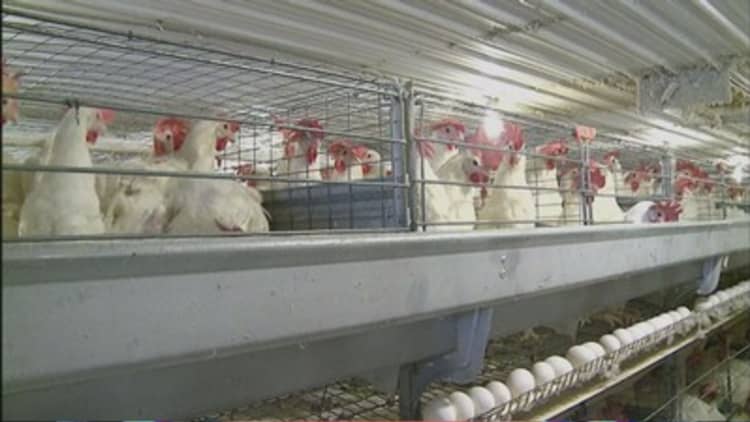
Food distributor Sysco Corp said on Friday that a record U.S. outbreak of avian flu would limit its chicken and egg supply for nine to 18 months, based on information provided to the company by its suppliers.
Sysco is the biggest U.S. food distributor, whose clients include restaurants, hotels and hospitals. The company is discussing options with its customers, including creating alternative menu items during the period, a Sysco spokesman said in an email.
It is too soon to tell whether the supply squeeze will have a material impact on financial results, spokesman Charley Wilson said. Poultry accounted for 10 percent of Sysco's revenue in 2014, according to filings.
Read MoreNebraska declares state of emergency over bird flu
The U.S. poultry and egg industry is grappling with the country's biggest outbreak on record of avian influenza, which has proven highly infectious and deadly for poultry. Governors in Nebraska, Wisconsin, Minnesota and Iowa have declared a state of emergency, and the outbreak has shown few signs of waning.
Earlier this week, Cargill Inc said it has implemented increased biosecurity measures at its facilities receiving liquid egg tankers and shell eggs from impacted states and that it is working with egg suppliers to ensure they are employing measures to prevent spread of the flu.
Meanwhile, on Thursday, Post Holdings Inc, calling the flu a "force majeure event," said it now estimates that 25 percent of its egg supply has been affected. Sysco is a major customer for Post's Michael Foods business, which sells egg products, according to filings.
Stifel Nicolaus analyst Christopher Growe expects Post's previous estimate of a $20 million financial impact in 2015 to at least double, according to a research note.
Growe said that Post's contracts require the company to go to the open market and to third parties to replace the lost supply at high prices. "We believe that by declaring force majeure, the company will be able to either pass higher prices onto customers or be relieved from the mandatory supply requirements," he wrote.

